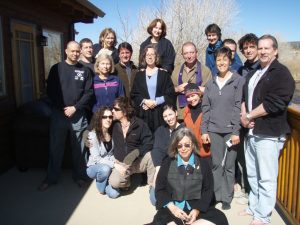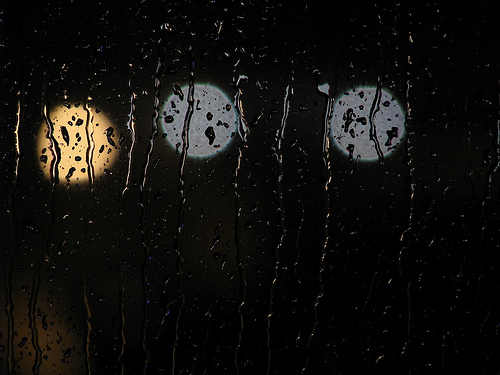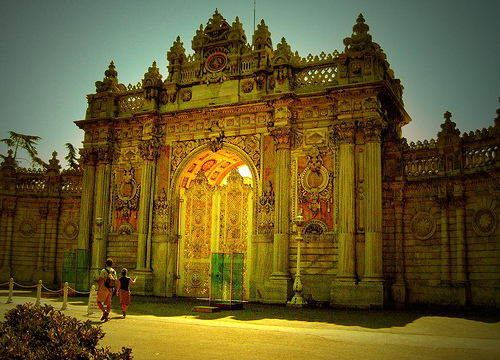
by John Greer | Apr 25, 2009 | Uncategorized, Zen

Lost Coin has been discussing and presenting the role of arts in practice. These practices in Zen are often referred to as “Ways”. They include painting, tea ceremony, martial arts, and many other forms – in this case poetry. As Zen establishes itself in the west our contemporary art and sciences will merge with and become vehicles for the practice of the way. This fine entry by John Greer is about the famous wandering poet and Zen practitioner Ryoken and about the contemporary experiences of Anthropology Professor and Lost Coin practitioner John Greer. – Doen
Going out to beg this spring day
I stopped to pick violets—
Oh! The day is over!
This poem was written by the 18th century Japanese Zen hermit monk and poet Ryokan. Ryokan wrote a lot of poetry on the subject of his day to day experiences as a Zen hermit who, however, lived a life, not of complete solitude, but of interpersonal interaction withthe people of a village not far from his hermitage. In particular, he loved to play with children and he developed regular relationships with individuals from whom he received his livelyhood. He made his living by begging. He was a Zen master, though he was never the head of a monastery or temple and never even taught students formally. But it looks to me that he taught through his interaction with the people he met in the market place of the village.
(more…)

by Daniel Doen Silberberg | Apr 23, 2009 | Uncategorized, Zen

I have been looking at a number of interesting blogs that deal with personal development. I think there is a great deal of valuable information out there. However an important element, sometimes missing is addressing the nature of our minds. How the mind works unconsciously and mechanically and how we can actually train our minds to understand and do so much more. Adding this meta-element – observation and training – changes the whole thing. We have understood this in music, athletics, chess, business and many other fields. Are we ready to start work on breaking the walls rather than decorating them with ideas, default behavioral patterns and beliefs.
We can look at is as a new age. The one after the age of information – the age of amplification. With information and amplification combined the limits expand exponentially.
by Daniel Doen Silberberg | Apr 23, 2009 | Uncategorized, Zen
Daniel Doen Silberberg Sensei talks about how collaboration in the practice is like collaboration of music. Zen practice will look different in the West than it did in Japan- that will take time, but Lost Coin can contribute by being a creative mix and influence.
Part 1
httpv://www.youtube.com/watch?v=2anxXwQBaXo
Part 2
httpv://www.youtube.com/watch?v=BN-N3kmPF80

by Tawni Anderson | Apr 20, 2009 | Uncategorized, Zen

Lost Coin, Boulder, April 2008
This year is turning into a spectacular one for Lost Coin’s retreats. We started with a stimulating one-day workshop in February in San Francisco, and next on the lineup are workshops in Düsseldorf, Germany and Boulder, Utah. We hope you can join us for one or both!
These workshops are not just for members of Lost Coin-we warmly welcome anyone who is interested in attending.
(more…)

by Daniel Doen Silberberg | Apr 13, 2009 | Uncategorized, Zen

The arts can be ways of expressing insights in a direct intuitive way. They can speak to the emotional intelligence as well as conveying understanding and realization. There is a history of this in Zen and in the Fourth Way. We intend to develop this aspect of practice as part of Lost Coin. As a first offering this is a short piece of music named Sun Buddha, Moon Buddha – a Koan in The Blue Cliff Record. It presents a reconciliation of the dualities of long and short time and the positive and negative of life experiences.
Many of us tend to favor our intellect in our quest for “knowing.” Conscious art can inform the emotions and body. We could call this fuller knowing “understanding.” Understanding has greater potency and is more likely to inform our being and actions.
sun-buddha-moon-buddha

by Gertje Heuser | Apr 8, 2009 | Uncategorized, Zen

Recently I read a book that was a real eye-opener to me. It was Diamond Heart, Book One by A. H. Almaas. Many of you will have already read it. For those who do not know the author and the book, A. H. Almaas is the founder of the Ridhwan school that is dedicated to inner work and the development of our essence or being. His teaching is–as far as I understand–mainly based on Gurdjieff’s Fourth Way, Sufism, and modern psychology.
In his book Almaas explains different facets of essence as, for example, truth, compassion, confidence, worthiness, and how we can realize these facets. He illustrates which psychological barriers in our personalities and which behaviour patterns hold us back from getting in contact with our true being and how to work on them.
What we do is always try to move away from suffering and to move towards happiness, and this tendency keeps us away from where we really are. Almaas emphasizes that we have to do this inner work in our daily lives. Our relationships, our work, and our little and big everyday problems give us the material that we need for self-study.
In every chapter I found many things that spoke to me directly and made me think about what requirements may hide behind my habitual acts and feelings. The chapter “Becoming an Adult,” for example, illustrates that many of our difficulties in life result from the fact that we are acting like children and refuse to become adults.
As an exercise I noticed my emotions and thoughts from this aspect. Of course I already knew that I do not like to take on responsibility and prefer others to do the things I feel uncomfortable with, but I actually did not know that this attitude is ruling my life to such an extent. I also did not fully realize that many of my not-so-nice attitudes like getting angry, blaming others, or lamenting are based on this mentality. This is a little frightening to see, but also gives me a push towards change.
The above is only a short example. I think that this book can really enrich our practice. So if you’re interested and decide to read the book or have already read it, I am curious to hear what you think about it.
by Daniel Doen Silberberg | Apr 1, 2009 | Uncategorized, Zen
Dismantling beliefs is one of the practices of the Lost Coin. When I look at beliefs I have held I often wonder where they came from. I find they aren’t based on any real evidence, not really grounded in reality. These beliefs are things I have heard from sources I don’t remember. When I have looked at it deeply I have often found that many of my beliefs are just perimeters surrounding territory I am afraid to go outside of – boundaries formed by fear.
Doen

by Kim Hancey Duffy | Mar 31, 2009 | Uncategorized, Zen

Daniel talked recently about actively “not knowing” what you are going to experience before you experience it. Don’t imagine you know what a Mormon temple looks like inside. Don’t imagine you know what a forsythia branch looks like in bloom. Go and take it in as if you’ve never seen one before.
This reminded me of a poem I have recited to myself every spring for the 20 years I’ve lived down a wooded lane. After months of snow, I’m so eager for the blossoms to emerge on the redbud tree. But what happens instead is a snowstorm, which threatens to dampen my spirits. After I remember this poem though, I go down the lane to see what surprises nature may have brought overnight. I’m glad I’ve been doing this for 20 years because, at 56 years old, I may have only thirty springs remaining to see the redbud tree in bloom.
Lovliest of Trees
Loveliest of trees, the cherry now
Is hung with bloom along the bough,
And stands about the woodland ride
Wearing white for Eastertide.
Now, of my threescore years and ten,
Twenty will not come again,
And take from seventy springs a score,
It only leaves me fifty more.
And since to look at things in bloom
Fifty springs are little room,
About the woodlands I will go
To see the cherry hung with snow.
A. E. Houseman
Photo by camra_art
by Daniel Doen Silberberg | Mar 26, 2009 | Uncategorized, Zen
Doen Sensei discussed the convergence of the study of excellence and the study of consciousness. The book “Talent Is Overrated” is mentioned with studies on high-performing individuals like Tiger Woods.
Sensei also talks about seeing reality.
Part 1
httpv://www.youtube.com/watch?v=BXGiA6OhuYg
Part 2
httpv://www.youtube.com/watch?v=d6PMEEEGRqI
by Tawni Anderson | Mar 18, 2009 | Uncategorized, Zen
I’ve been talking lately about choosing to change. Change can be very difficult, whether it’s a major change or even just something relatively small. But choosing to change, and acting on that decision, increases our personal power and, if we stay with “what is”, also makes us happier. What is it that we’re afraid of? Why do we protect ourselves from our own power? Why are we afraid to take paths that will empower us? If we all did what we wanted, if we were fully empowered, what would be so wrong with that?
Well, other people might be unhappy.
And sometimes this is the excuse we use: we won’t mix things up for fear, say, of upsetting our spouse. But what this really means is that we don’t want the anxiety of worrying about hurting that person.
But everything you do will work out just fine if you just do what you want to do. Be yourself. For many who were raised in a Judeo-Christian tradition, there’s an underlying belief that we think we’re somehow “bad.” We fear that if we were truly empowered, we’d be bad or do bad things.
But whatever you feel, you’re going to feel anyway. The difference is when you’re empowered, you’ll also be doing what you want. If you don’t take your power, you’ll still feel the same way, but you also won’t be doing what you want.
The difference between empowerment and non-empowerment is fear. Nothing gives you energy like not being afraid and doing what you want. When you avoid living, you cheat everyone around you too, because they don’t get the benefit of who you really are. So as long as you’re not, say, an addict, you’re not going to do harm by doing what you want.
Be in the moment, always, but choose to change your life if that is what you want. You’ll be happier, and so will the people around you.
(Adapted from a talk given by Doen Sensei, November 2007)







Recent Comments